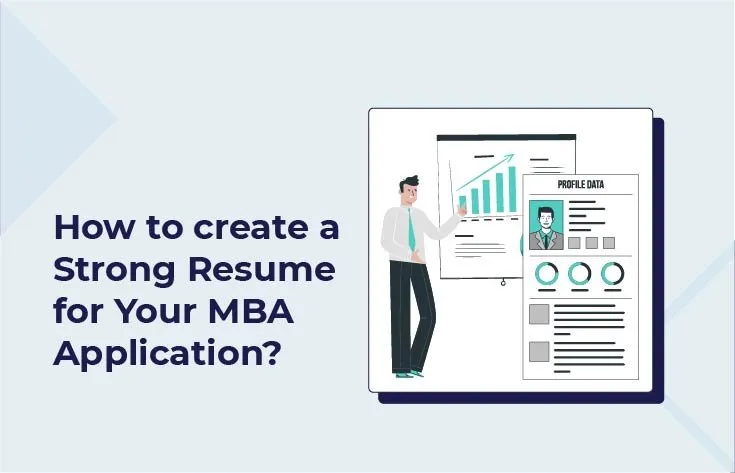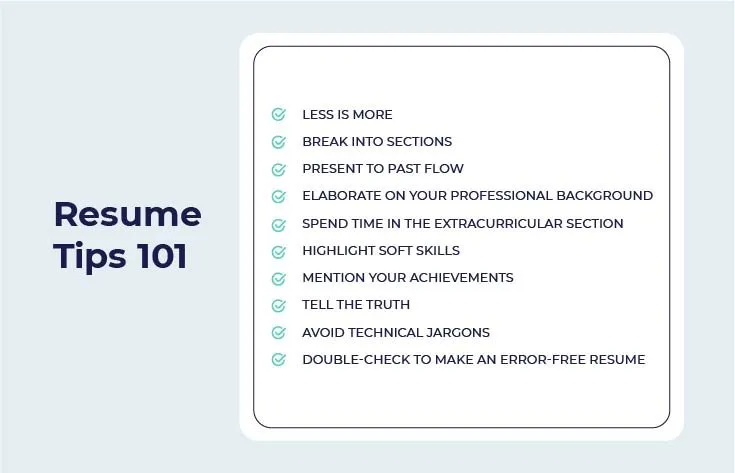How to create a Strong Resume for Your MBA Application?

A resume is one of the most important components of your entire MBA application. It is the first thing adcoms see when evaluating your professional experience and overall career trajectory. And, articulating a strong impact in your professional journey through your resume is very important.
Generally, we know it should be 1-2 pages and contain all the details about your past experiences. However, reading all the technical information about someone’s professional experience can be very daunting. Hence our experts suggest that to stand out, your resume should-
1. Reflects you as a very strong leader who has a huge impact on the organizations s/he has worked for
2. Strong alignment with what each of your target schools is looking for in your professional journey
3. Bring strong coherence to the narrative you are building in your essays.
The above 3 require a good brainstorming phase on your entire application and a strong understanding of your target schools. Then, if you’d like, you can schedule a free profile evaluation session with us, where we’ll hear your story and help you build a unique MBA pitch for your target schools.
This article will help you create a strong resume for your MBA application, which is a major factor and an opportunity to impress the admission committee.
Before diving into the article, remember, “An MBA resume is not the same as a job resume.”
Tips to Follow
Less is more
Break into sections
Present to Past Flow
Elaborate on your Professional Background
Spend time in the Extracurricular Section
Highlight Soft Skills
Mention your Achievements
Tell the Truth
Avoid technical Jargons
Double-check to make an error-free resume

1) Less is more
We suggest your MBA resume should not exceed two pages (ideally contained in just 1 page). Include only the relevant and impactful information from your professional and Non-professional history, avoid explaining the same thing in two ways and keep it concise.
2) Break into Sections
Generally, Adcoms spend a max of 10-15 mins on your application. These will decide whether you will move to the next stage or not. So, create separate sections for education, experience, and skills. Use proper fonts, margins, and spacing between bullet points to make reading soothing.
3) Present to Past Flow
The best practice is to format your resume from present to past. Then, mention those things at the top that you feel are the most important in your background. E.g., If you have three work experiences, note your recent one, then so on.
4) Elaborate on your Professional Background
Your professional experience must relate to the real business world. Elaborate more about your roles and responsibilities, projects you contributed to, and their importance to the organizations, offer stats and figures relevant to the experience you describe, etc.
5) Spend time in the Extracurricular Section
Adcoms don’t look at quantity but quality. So highlight your volunteer work and extra-curricular activities. But restrict yourself to listing 2-3 maximum. They don’t want to know how many activities you participated in.
6) Highlight Soft Skills
Sometimes highlighting your soft skills is a bigger task than you expected when you have a very technical role. First, ponder your leadership stories, teamwork, empathy, eagerness to learn, etc. And then, try to find common evidence of 2-3 qualities across your work experience, extracurriculars, achievements, etc. These 2-3 qualities will become your USPs and should come across your entire application, not just your resume.
7) ‘IMPACT’ from your Achievements
How you have impacted organizations and communities will matter the most in your application. And most applications, when talking about their achievements, fail to bring impact to their MBA resume.
This article will help you understand how you can bring impact to your resume and entire application.
8) Be authentic
The committee evaluating your profile evaluated thousands of applicants for tens of years. Hence, giving out 100% authentic information in your resume and the entire application is important. It’s better to have only a few things than to exaggerate things.
9) Avoid technical Jargons
We understand that you come from engineering, medical, or art backgrounds. Still, adcoms might not have experience in your field or cannot understand technical terms, so avoid technical jargon to ease the process. In addition, they only have a few minutes to go through your entire application; ease of understanding of your resume is very critical for holding their interest.
10) Double-check to make an error-free resume
Just the rookie mistake! Oo, make a habit of proofreading before submitting documents, not only a resume. It is a good way to submit an error-free resume.
In the end, we suggest you mention those things that are creating impact, and you are confident to answer when asked in an interview (hence should be very collinear).
If you think you need some expert advice on your resume or any other component of your application, book a 1:1 Profile Evaluation with our experts and get in-depth feedback on your strengths and weaknesses and honest chances to your target schools.




Leave a Reply